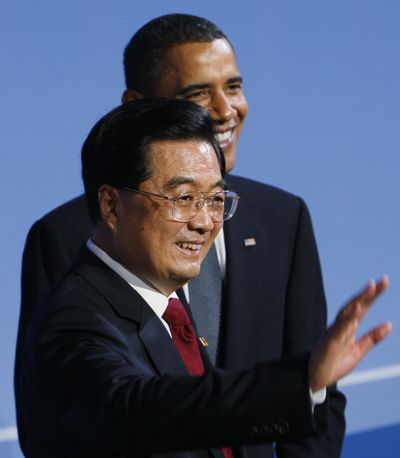Hu coming to America amid chill in relations
Events of last year sap level of China-U.S. trust

WASHINGTON – President Barack Obama and Chinese President Hu Jintao will meet in Washington on Tuesday and Wednesday in a state visit meant to reset relations after a rocky year, but while dozens of major global issues will be on the table, one thing will be missing: trust.
From the waters of the South China Sea to the halls of Congress to the coffers that hold Beijing’s deep foreign currency reserves, the United States and China increasingly eye each other with suspicion.
Locked in a multitrillion-dollar embrace of trade and debt, the leaders of the world’s two largest economies will work together where they can. But mutual suspicion and political realities mean that Obama and Hu are unlikely to announce major breakthroughs on sensitive issues such as currency reform or human rights.
“Overall, you’ve got a lack of trust, mutual trust,” said Drew Thompson, the director of China studies at the Washington-based Nixon Center, a foreign-policy research center.
The Obama administration will use the White House meetings with Hu to prod China to let its currency, the yuan, float freely, making American exports more competitive; to help rein in North Korea’s nuclear ambitions; and to strengthen military-to-military ties, U.S. officials and private experts said.
American leverage is limited, however: China holds nearly $1 trillion in U.S. government debt.
Hu, whose term expires in 2012, apparently is hoping to burnish his legacy, improve China’s image in the United States – he also will travel to Chicago – and push for wider Chinese investment here. China lobbied for the official state visit, with all its pomp, for Hu. It’s the first for a Chinese leader since 1997.
The 14 months since Obama last visited China have been a roller coaster for Sino-American relations.
China suspended military exchanges last January to protest new U.S. arms sales to Taiwan, which Beijing considers a renegade province. Then China began pressing maritime and territorial claims in East Asia, alarming the United States and its allies.
Washington pushed back. U.S. officials felt, until recently, that China had failed to dissuade North Korea from provocative actions, such as last year’s sinking of a South Korean corvette and shelling of South Korea’s Yeonpyeong island.
Against that backdrop, Obama and Hu will attempt to set what’s arguably the world’s most important relationship on a smoother course.
“America and China have arrived at a critical juncture, a time when the choices we make, both big and small, will shape the trajectory of this relationship,” Secretary of State Hillary Clinton said Friday.
Clinton described the relationship as an increasingly complex global “entanglement” and said, “This is not a relationship that fits neatly into the black and white categories like ‘friend’ or ‘rival.’ ”
In Obama’s first two years, she said, “We have seen some early successes and also some frustrations.”
The gripes don’t come only from the American side. Many Chinese accuse the United States of trying to stunt their country’s rise.
In the weeks leading up to the visit, diplomats from both countries have been negotiating a formal joint statement. But it remains to be seen whether Obama and Hu will issue a communiqué, and if so, whether it will go beyond bland generalities.
“There are some real limitations. And this will likely not be a sort of historic summit or transformational summit in U.S.-China relations,” said Michael Green, an aide to President George W. Bush who’s now at the Center for Strategic and International Studies, a center-right research institute.